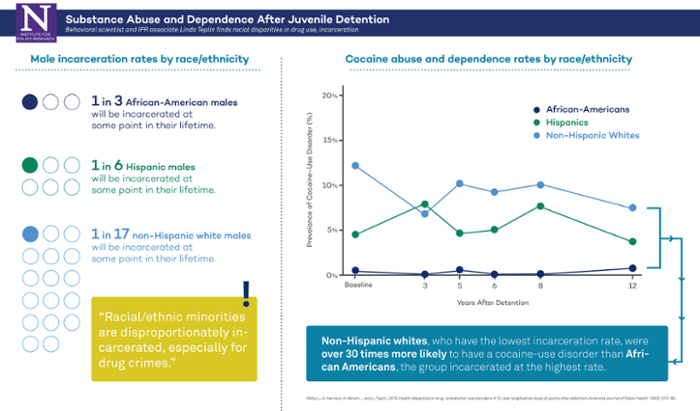Infographic: Substance Abuse and Dependence After Juvenile Detention
Among delinquents, study finds whites more likely than blacks to abuse drugs
Get all our news
Our findings add to the growing debate on how the war on drugs has affected African-Americans. We found that African-Americans are less likely than other racial/ethnic groups to abuse hard drugs. Yet African-Americans are disproportionately incarcerated for drug crimes.”
Linda Teplin
Behavioral scientist and IPR associate
Click on the image above to see a larger version of the infographic.
Abuse of and dependence on “hard drugs,” such as cocaine, hallucinogens or opiates, are far less common among delinquent African-American youth than delinquent Hispanics and non-Hispanic whites, according to a recent Northwestern Medicine study co-authored by behavioral scientist and IPR associate Linda Teplin, associate professor Leah Welty, and their colleagues.
Published in the American Journal of Public Health, the 12-year longitudinal study followed 1,829 male and female youth from when they were detained at the Cook County Juvenile Temporary Detention Center in the 1990s until their late 20s. The series of interviews conducted during this period offers the first comprehensive picture of drug and alcohol abuse and dependence in delinquent youth.
In the 12 years following their detention, Hispanic and Caucasian youth were between 20 and 30 times more likely to abuse cocaine when compared with African-American youth. Yet African-Americans are incarcerated at much higher rates than either of these two groups.
“Those findings are striking, considering the widely accepted stereotype of African-Americans as the most prevalent abusers of ‘hard drugs,’” Teplin said.
According to a U.S. Department of Justice estimate for males born in 2001, 1 in 3 African-Americans and 1 in 6 Hispanics will be incarcerated at some point during their lifetimes—compared with only 1 in 17 Caucasians.
“Our findings add to the growing debate on how the war on drugs has affected African-Americans,” Teplin explained. “We found that African-Americans are less likely than other racial/ethnic groups to abuse hard drugs. Yet African-Americans are disproportionately incarcerated for drug crimes.”
The study also revealed gender differences: Just over 91 percent of males and nearly 79 percent of females had a substance-use disorder by their late 20s. Males were more likely to abuse or be dependent on marijuana and alcohol than females, while females were more likely to abuse or be dependent on cocaine, opiates, amphetamines, and sedatives.
“Unfortunately, substance-use disorders were the rule, not the exception,” said Welty, who was the study’s lead author. “These young adults already face substantial challenges in completing education, establishing careers, and building families. Substance abuse further compromises their futures.”
Linda Teplin is Owen L. Coon Professor of Psychiatry and Behavioral Sciences and an IPR associate. Leah Welty is associate professor of preventive medicine. This article was adapted from a Northwestern News release.
Published: October 28, 2016.
